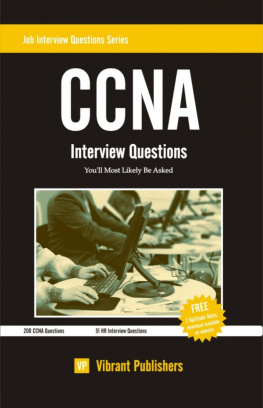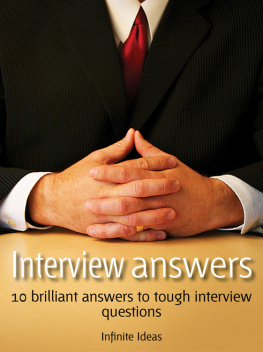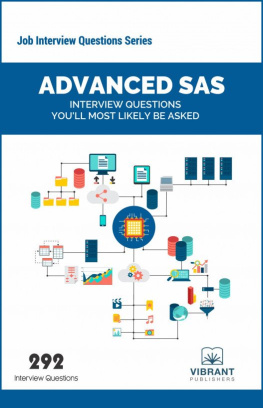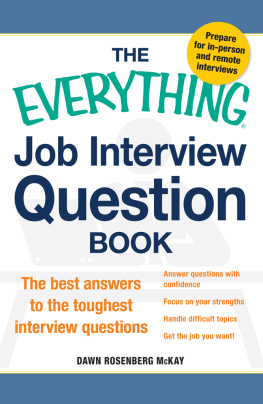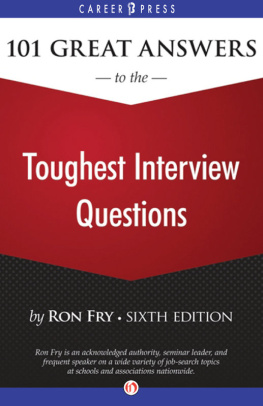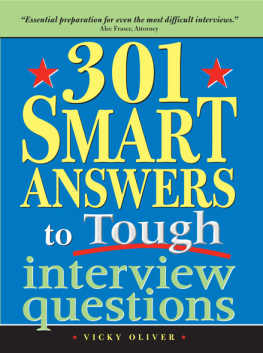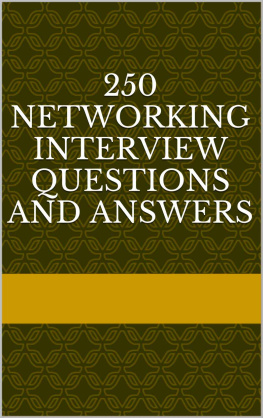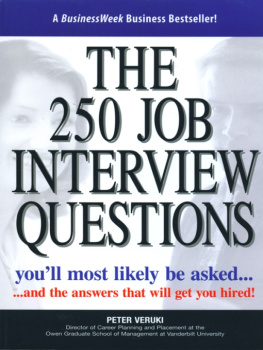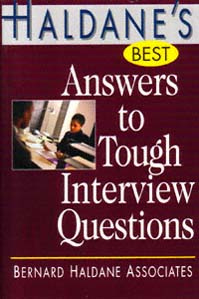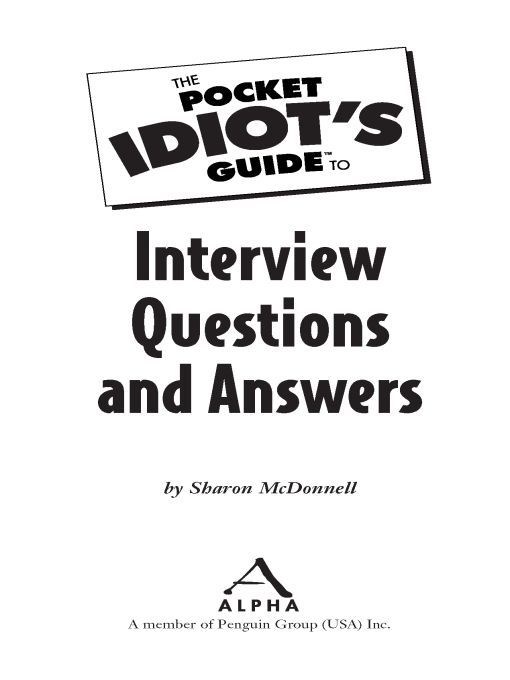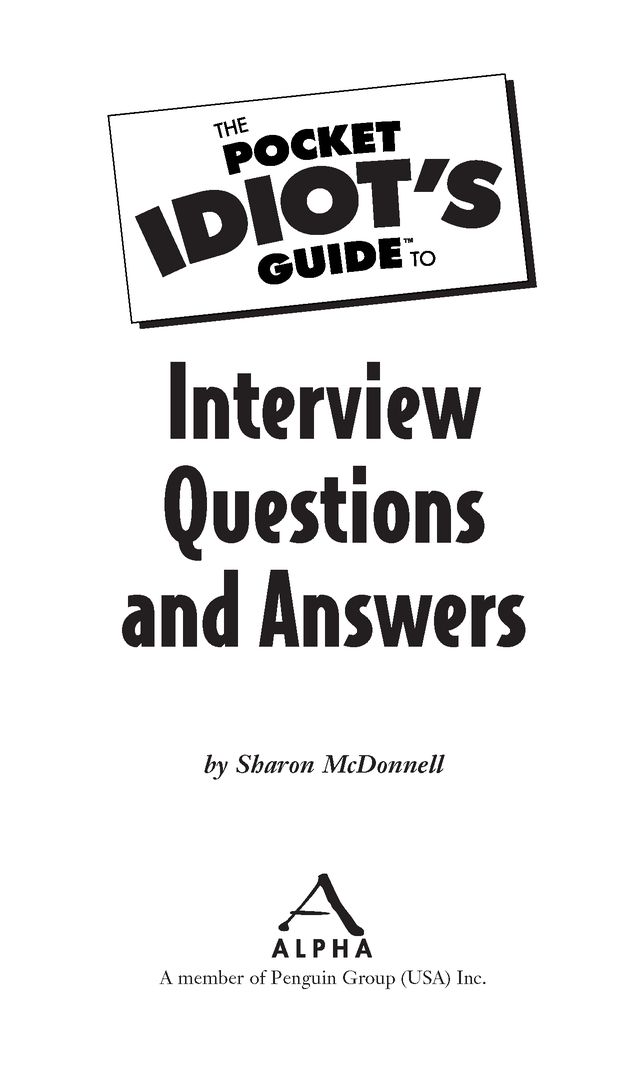Table of Contents
Introduction
We know youre no idiot. If fact, if youre reading this book, you must be pretty smart. Thats because youre wise enough to know what you dont knowand thats job interviews.
Years ago, perhaps you wouldnt have needed this book. Back in the day, people kept jobs for many years, and often spent a lifetime in a single career. Imagine how that cut down on the number of job interviews people had to endure. But in recent years, layoffs have spread like wildfire, engulfing even some of the more paternalistic firms who prized loyalty. Statistics now show that the average person has several careers in a lifetime.
So like it or not, people are having to go on more job interviews than before, and employers are becoming a lot fussier with technology and a global economy changing things so fast. But going on more interviews doesnt mean you will end up enjoying or understanding them more, and thats the reason why you need this book.
How to Use This Book
This book is designed to provide you maximum information while requiring you to expend the minimum effort necessary to find it. If you need advice on a specific topic, simply refer to the table of contents or index. If you need an overview of the big picture, take a breeze through each chapter. And if you need a serious but quick briefing, check out the handy summary at the end of each chapter. Within each chapter, you will find that the following elements provide you with tips, notes, and things to watch out for.
Job Savvy
Smart job-hunters follow these tips to ace the competition in interviews.
Job Jargon
Uh-oh: what not to say or do in job interviews.
Job Jinx
Would an interview by any other name smell as sweet? Yeah, right. Learn the different interview types and other words good to know if youre facing some interviews.
Acknowledgments
Special thanks to executive recruiter Julie B. Kambf of JBK Associates; Kate Wendleton of The Five OClock Club career coaching network; John A. Challenger of outplacement firm Challenger, Gray & Christmas; Bill Coleman of Salary.com; and executive recruiter Neil Ajilon of Ajilon Consulting for their help in researching this book. And a hearty thank you to Mike Sanders, Nancy Lewis, and the rest of the Alpha production team.
Trademarks
All terms mentioned in this book that are known to be or are suspected of being trademarks or service marks have been appropriately capitalized. Alpha Books and Penguin Group (USA) Inc. cannot attest to the accuracy of this information. Use of a term in this book should not be regarded as affecting the validity of any trademark or service mark.
Chapter 1
Oops Mistakes Job-Hunters Make
In This ChapterWhy should I put myself in the interviewers place?
What are the top job-hunting mistakes?
How do I avoid making mistakes?
How do I research properly?
Job interviews consistently rank as one of lifes most stressful events, right up there with divorce, death of a loved one, and major surgery. But I am going to share with you two important points that will quell the heart-pounding, stomach-churning feeling that often goes on during an interview. They are
Get prepared; and
Put yourself in the interviewers shoes.
Once you do both of these things, it will make interviews much easier, so much so that you may even look forward to them.
Get Prepared
When I say to get prepared, it means a couple things:
Prepare for interview questions
Prepare to talk about yourself and your accomplishments in your work and nonwork life
Prepare with information about the employer you are interviewing with
Prepare to ask questions of your own
Youve already made one excellent step forward in buying this book, so congratulationsyoure on your way!
Put Yourself in the Interviewers Shoes
Think of the interviewer as a fearful person. Perhaps the interviewer fears that
You wont be able to do the job.
You are able to do the job, but just wont come in often enough.
You are able to do the job, but just arent willing to devote much time or thinking to it.
You are able to do the job, but will quit so soon itll make his head spin.
You have some terrible flaw that he was supposed to ferret out during the interview.
You will cost the company a lawsuit or put it on the six oclock news.
You may drive the company nuts.
It helps to think of the interviewer in this light, because it puts you inside his head and gives you a sense of what he is looking for, trying to avoid, and, whats worse, trying to do under pressure.
Job Savvy
t is very good practice to try being the interviewerseeing things from her perspective. It can be interesting to see how interviewees think on their feet and answer questions, and many times, to see what not to do. Give it a try with your friends.
The Number-One Mistake: Lack of Research
The number-one mistake hiring managers say job-hunters make is a lack of research about the employer, the job, and sometimes even the industry. It simply drives interviewers nuts when an interviewee knows little or nothing about the company or organization and the products it makes, services it sells, or causes it champions, and the top competitors and challenges it faces in todays market. Yet its frightfully common, and a job-hunter armed with knowledge about the employer, job, and industry has an immediate edge over much of the competition.
Job Savvy
Research is the key word in job interviews, just like location is in real estate. Research the employer, industry, and job to the hilt, so youll be prepared to answer questions and ask good ones.
But thats not the only mistake. Here are the top five mistakes job-hunters make in interviews, according to a survey by CareerBuilder.com (in order).
1. What They Say (or Dont Say)
The biggest mistake is how job-hunters communicate, whether its discussing their personal problems instead of answering or asking questions about the employer, sounding as if theyre robots reading a script, answering in monosyllables, or bad-mouthing ex-bosses. Some blurt out real bloopers, like the job-seeker who wanted the position because it offered health insurance, or the customer service applicant who confessed to not being a people person.


